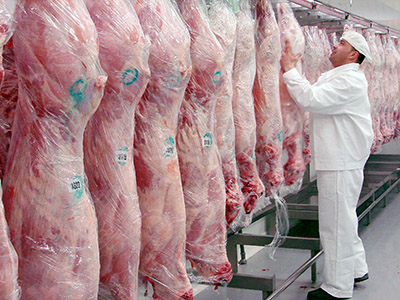Meat could be transported above 7°C
7th April 2014 EUROPE: Meat could be transported at temperatures above 7°C without causing additional bacterial growth, says the European Food Safety Authority (EFSA).
EUROPE: Meat could be transported at temperatures above 7°C without causing additional bacterial growth, says the European Food Safety Authority (EFSA).
That is the main conclusion of an EFSA scientific opinion on the public health risks related to the maintenance of a cold chain during the storage and transport of meat.
The EFSA argues that as most bacterial contamination, including salmonella, E.coli and listeria, occurs on the surface of the carcass, only the surface temperature is an appropriate indicator of bacterial growth.
Research is said to have suggested that it is possible to apply slaughterhouse carcass target temperatures higher than the currently mandated 7°C throughout the carcass (including the core) in combination with different transport durations without obtaining additional bacterial growth.
The EFSA’s study follows a request from the European Commission to deliver a scientific opinion on whether or not it was possible to apply alternative core temperatures (higher than the current requirement of 7°C in Regulation 853/2004) in combination with specific transport durations for meat (carcasses) of domestic ungulates after slaughter without increasing the risk associated with the growth of pathogenic microorganisms.
It was also requested that the Panel recommend, if appropriate, combinations of maximum core temperatures for the loading of carcasses and maximum transport times.
The current legislation requires that carcasses be immediately chilled after post-mortem inspection to ensure a temperature throughout of not more than 7°C in the case of meat and not more than 3°C for offal.
In practice, therefore, the core temperature must achieve a minimum of 7°C but the EFSA says it is unclear why this target temperature was selected as some pathogens will grow at 7°C. In addition, the absence of a time limit by which the 7°C core temperature must be achieved also introduces the possibility that carcasses could be held at temperatures that support the growth of other pathogens such as salmonella for extended periods while still complying with the legislation.
More important for the mandated tasks was the focus on the temperature throughout the meat including the core, rather than exclusively on the surface temperature. As the vast majority of bacterial contamination occurs on the surface, the EFSA argues that the carcass surface temperature and not the core temperature is a key determinant of bacterial growth.







